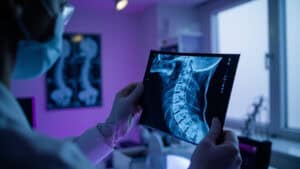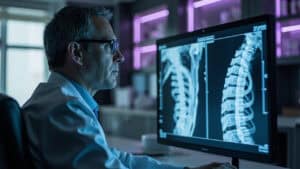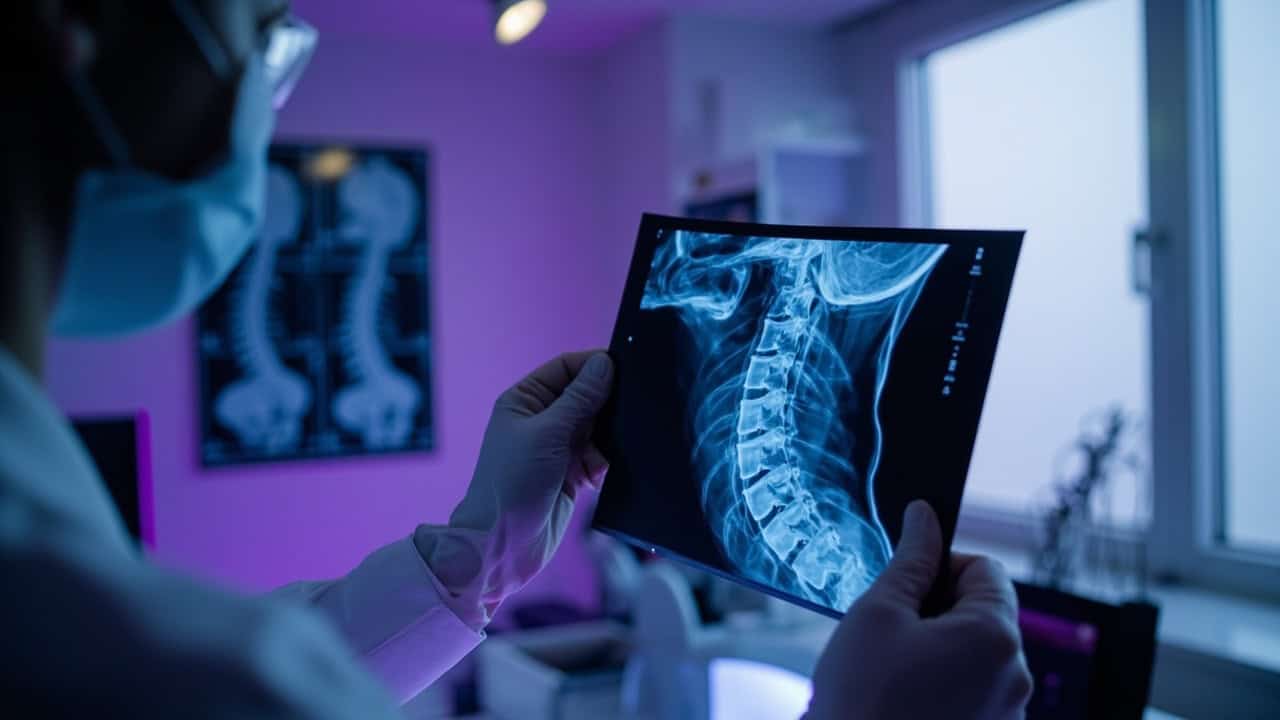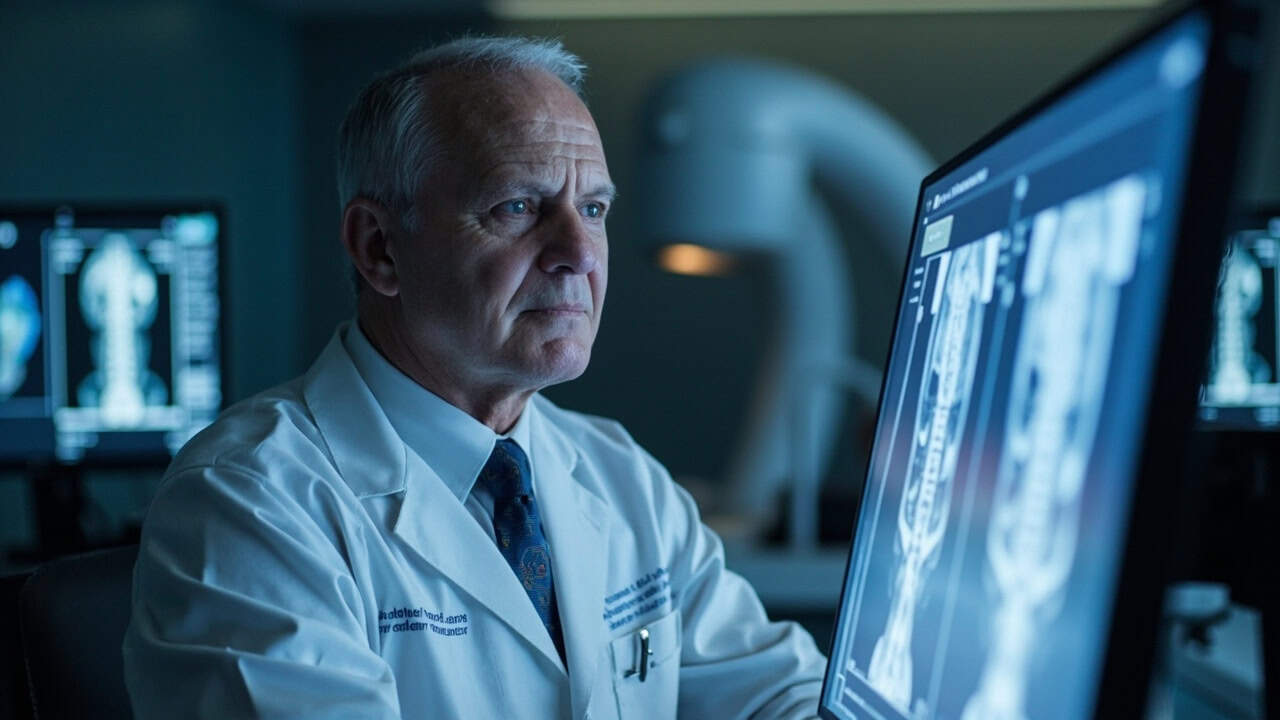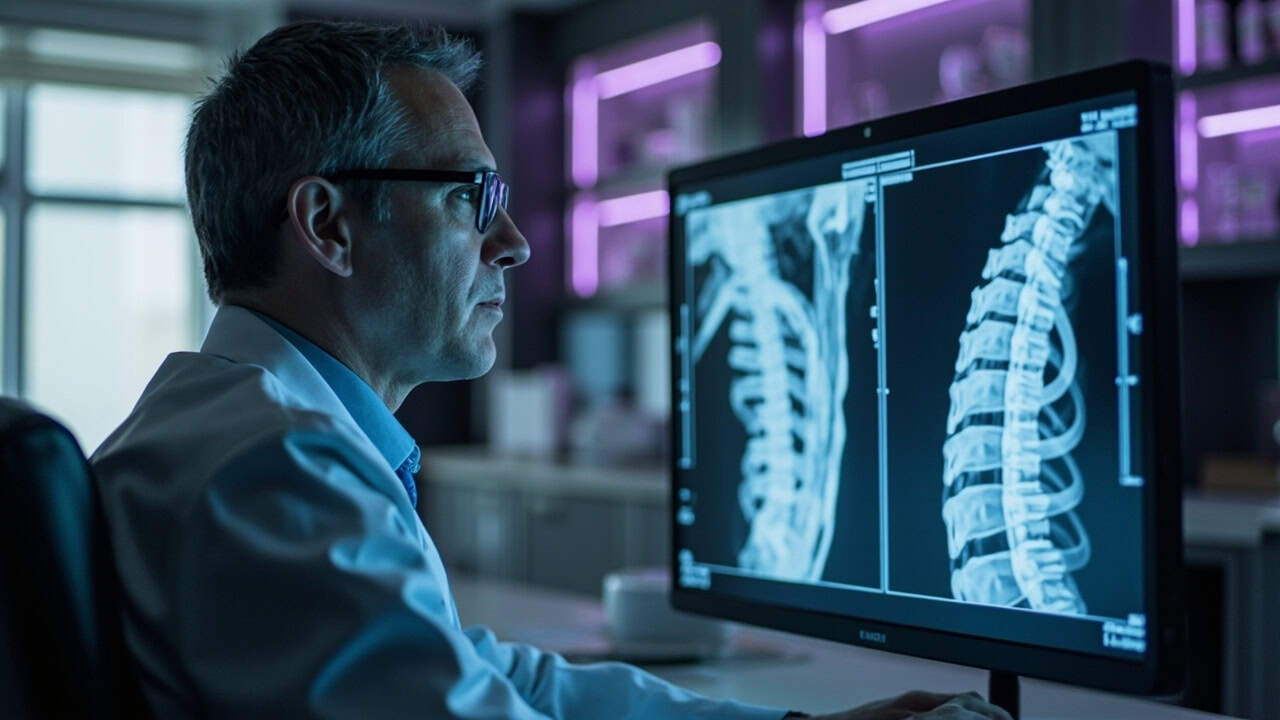Understanding If A Herniated Disc Can Cause Permanent Nerve Damage: A Medical Guide
Written by Dr. Matthias Wiederholz, MD | Last Updated: December 2024
Quick Insights
Can a herniated disc cause permanent nerve damage? While herniated discs occur when disc tissue presses on spinal nerves, permanent nerve damage is exceedingly rare with timely medical intervention. Most patients experience temporary symptoms like numbness, tingling, or muscle weakness that resolve through conservative treatment or minimally invasive procedures. Research shows only 0.1% of patients experience temporary nerve irritation, with zero cases of permanent injury when treated promptly by qualified spine specialists.
Key Takeaways
- Permanent nerve damage from herniated discs is exceptionally rare with timely intervention.
- Typical symptoms include numbness, tingling, or muscle weakness in the arms or legs.
- Delay in treatment may increase the risk of lasting nerve changes, especially for those wanting to remain active.
- Many patients regain full function through modern, non-surgical options like regenerative procedures.
Why It Matters
Understanding the relationship between herniated discs and nerve damage helps you act early, protecting your mobility and quality of life. Quick decisions can mean getting back to sports, family, or work—without fear that your current pain will steal your independence forever. Knowledge today gives you power, hope, and confidence in your recovery journey.
As a quadruple board-certified spine specialist and certified Master Instructor for the Discseel® procedure, I understand just how frightening back pain can be—especially when you worry whether a herniated disc might cause permanent nerve damage.
A herniated disc occurs when the nucleus pulposus (the inner, gel-like core) breaks through the annulus fibrosis (the disc’s tough outer ring), sometimes pressing on nearby nerves. While nerve irritation from a herniated disc can be alarming, true permanent nerve damage is exceedingly rare—especially when addressed promptly with today’s advanced, non-surgical care options here in Houston, TX.
Research confirms that the risk of lasting injury is extremely low; for instance, one systematic review found only a 0.1% incidence of temporary nerve irritation and zero cases of permanent damage. That’s why fast assessment and minimally invasive, regenerative treatments—like those offered at Performance Pain and Sports Medicine—are so important.
If you’ve been sidelined by pain and fear of missing the activities you love, you’re in the right place to get answers and real hope.
What Is a Herniated Disc?
A herniated disc occurs when the soft, gel-like center (nucleus pulposus) pushes through a tear in the tough outer layer (annulus fibrosis) of a spinal disc. This can put pressure on nearby nerves, which may lead to pain, numbing sensations, or muscle weakness.
Your spine is made up of bones called vertebrae, with discs between them acting as natural cushions or shock absorbers. Each disc consists of a sturdy outer ring and a soft, jelly-like center. If the outer ring weakens or tears—often due to aging or stress—the inner material can bulge out or herniate.
Common Causes of Herniated Discs
The most common cause is age-related wear and tear, known as disc degeneration. However, everyday movements—like lifting a child or twisting to grab something—can trigger a herniation, especially if the disc is already weak or dehydrated. In my clinic, I’ve helped countless patients who were surprised to develop symptoms after an ordinary activity. Many did not realize that even seemingly minor movements can be the final straw for a compromised disc.
Research backs this up: disc dehydration reduces a disc’s ability to absorb pressure, making it much more likely to get damaged. For example, recent studies on discogenic pain explain why weakened, dehydrated discs are so vulnerable to injury. This highlights the importance of both prevention and early detection.
Learn more about what disc desiccation is and how it impacts spine health.
How Can a Herniated Disc Affect Your Nerves?
When a herniated disc pushes into or irritates a nearby nerve, it can disrupt the normal nerve signals that travel to and from your arms or legs. The result? Pain, tingling, numbness, or even loss of strength in the area that the nerve supplies.
Nerve Root Compression
This is when disc material directly compresses a spinal nerve root (the bundle of nerves branching from your spinal cord). Even a small amount of pressure can sometimes cause unmistakable symptoms, like sharp, shooting pain radiating down your arm or leg—a condition known as radiculopathy (nerve pain that “travels”).
As a quadruple board-certified regenerative medicine specialist, I’ve observed that the precision of matching a patient’s spinal condition with advanced, targeted treatments like Discseel® significantly enhances their outcomes—especially when nerve root compression is involved.
Risk of Delayed Treatment
If you ignore or delay care, the nerve has more time to become irritated or injured. This can make symptoms stick around longer, and in extremely rare cases, lead to more permanent changes. Most of the time, first-line treatment can include non-prescription pain medication, physical therapy, and, occasionally, targeted injections for short-term relief.
A comprehensive review of herniated disc care notes that epidural steroid injections are especially effective for early pain relief, and active therapies (like guided exercise) help most patients improve without surgery.
In my practice, I always tell patients, Don’t tough it out if pain, tingling, or weakness starts impacting your life. Early assessment leads to the best nerve outcomes.
Read our comprehensive guide to L5-S1 bulging disc symptoms and treatment.
Can a Herniated Disc Cause Permanent Nerve Damage?
This is one of the most common and understandable fears patients bring to my office—and the answer is both reassuring and factual: permanent nerve damage from a herniated disc is extremely rare, especially with modern management and prompt medical attention.
How Often Does Permanent Damage Occur?
Let’s look at the evidence. The largest recent studies, including a comprehensive systematic review, found that *only 0.1% of patients experienced temporary nerve irritation after minimally invasive disc procedures—and there were zero cases of permanent nerve injury* according to published systematic review findings. The overwhelming majority recover their strength, function, and sensation, particularly when treatment is not delayed.
What Increases the Risk?
Permanent nerve changes remain very rare, but the risk increases with:
- Severe, unrelieved nerve compression over time.
- Sudden loss of bowel/bladder control or inability to move a limb.
- Ignoring escalating symptoms such as growing numbness or weakness.
In my experience, most cases seen early—even when the disc is clearly herniated—resolve with appropriate, targeted care. The key is not to ignore symptoms that worsen or do not improve with rest. Acting early means a much higher chance of full recovery.
Clinical Insight:
“In my practice, I frequently encounter patients who have spent years exploring treatments—from surgeries to pain medications—without achieving meaningful relief. Often, they are unaware that minimally invasive regenerative solutions like Discseel® can effectively restore their spine health and significantly reduce the risk of lasting nerve harm.”
Learn more about disc tear treatment to restore spinal integrity.
What Are the Symptoms of Nerve Damage From a Herniated Disc?
The symptoms you experience depend on which nerve is affected and how badly. It’s important to recognize these signs early so we can intervene before long-term changes occur.
Symptoms to Watch For:
- Numbness or tingling in arms, legs, hands, or feet.
- Muscle weakness, such as easily dropping items or trouble pushing off with your leg.
- Sharp, shooting pain radiating to the arm (if in the neck) or leg (if in the lower back).
- Loss of reflexes in the affected area.
- In extreme cases: changes in bowel or bladder control (medical emergency).
Experience-Based Insight:
“Having personally performed over 10,000 regenerative spine procedures, I’ve consistently witnessed that truly restoring function and alleviating chronic pain involves not just clinical excellence, but a deep emotional and functional understanding of each patient’s needs. I always emphasize to my patients: listen to your body—if you’re losing strength, feeling numb, or your symptoms suddenly worsen, seek a medical evaluation right away.”
When to Seek Medical Attention
Seek immediate care if you experience:
- Sudden loss of bowel or bladder control.
- Severe or quickly worsening weakness (unable to move a limb).
- Numbness in your groin or inner thighs (sometimes called “saddle anesthesia”).
Don’t wait—quick evaluation can be crucial to preserving nerve health.
When Is Nerve Damage Permanent?
Nerve changes are considered permanent only if symptoms persist for several months despite the right treatment efforts. However, this scenario is rare—most people recover function, even if it takes weeks or months.
What Determines Permanence?
The odds of recovery depend on:
- Duration of nerve compression (shorter is better)
- Severity of compression (complete loss of muscle strength vs. mild numbness)
- How quickly care is started (sooner = better outcomes)
A systematic review found that early surgery (within 6 weeks) for lumbar disc herniation leads to over a 90% recovery rate in cases with mild or moderate nerve issues.
Professional Assessment:
“As a Master Instructor in the Discseel® Procedure, I help patients and other doctors understand that while the symptoms may feel severe and frightening, the risk of true permanent damage remains quite low with timely, proactive care. Those with severe or unaddressed compression for months do face higher risks, so I strongly encourage not delaying evaluation.”
Learn more about degenerative disc disease treatment options.
Modern Solutions for Herniated Discs—Minimally Invasive Options in Houston
There’s good news: most herniated disc problems can be managed successfully without surgery, using cutting-edge, minimally invasive techniques available right here in Houston.
Conservative Treatments
Most patients start with straightforward, non-surgical options:
- Physical therapy and guided exercise programs
- Anti-inflammatory medications (like ibuprofen)
- Epidural steroid injections for fast pain relief and inflammation control
Clinical guidelines confirm that these approaches provide good symptom improvement for recent (acute or subacute) cases of sciatica and nerve irritation. In fact, many patients improve enough not to need any additional procedures.
The Discseel® Procedure: How It Works
For patients who do not find relief after conservative care, advanced regenerative options are now available. The Discseel® Procedure is a revolutionary outpatient solution that seals and repairs the damaged disc using a special biologic fibrin sealant and, crucially, stimulates your own natural collagen to regrow and strengthen the disc wall.
What makes Discseel® so unique?
- Non-surgical, no hospital stay, no hardware or cutting.
- Preserves spinal mobility (unlike fusion).
- Minimal downtime—most patients resume daily activity within days.
Clinical Experience:
“In my Houston and New Jersey practices, I have personally overseen more than 10,000 minimally invasive regenerative spine procedures—including Discseel®—with remarkable success for patients who would otherwise face spinal fusion or chronic pain.”
Research shows fibrin sealant treatments like Discseel® lead to substantial pain and function improvement lasting well beyond 24 months.
See Discseel® reviews and testimonials from real patients.
How Discseel® Compares:
Traditional surgery often removes or fuses parts of your spine, increasing recovery time and limiting movement. Discseel® targets the root problem—internal disc tears or herniations—without removing any tissue.
If you’ve tried conservative therapy without success, Discseel® may help you avoid more invasive measures and get back to your favorite activities faster.
Learn about effective treatment options for L5-S1 disc herniation.
Real Experiences: Discseel® Success in Houston
I’ve seen firsthand how the Discseel® Procedure can transform lives—offering results where traditional approaches fell short.
Comparative Expertise:
“Unlike larger clinics where patients may rarely see the same provider, I personally oversee every aspect of each patient’s care—from the detailed diagnostics, to the procedure, through rehabilitation. This concierge-level support ensures you feel heard, understood, and empowered at every step.”
What Real Patients Are Saying:
“I had awful lower back pain for years. After seeing Dr. Wiederholz for the Discseel, I felt real improvement within just weeks. He explained everything and was extremely compassionate. Now, I’m finally back to hiking and enjoying family time!”
Our clinic’s outcomes reflect the 82% success rate documented in research, far exceeding that of spinal fusion. Most patients appreciate the rapid recovery and the fact that their spine stays flexible.
Ready to discover if Discseel® could help you, too?
Tell us about your symptoms – request your Discseel® consultation.
Why Choose Dr. Matthias Wiederholz For Spine Care?
Quadruple Board Certification—Why It Matters
As Houston’s only quadruple board-certified, master-instructor for Discseel®, my training and expertise are unique. I was honored to be personally trained by Dr. Kevin Pauza—the inventor of the Discseel® Procedure—and am one of only a handful of master instructors in the world.
This gives my patients access to:
- The most current, advanced regenerative techniques.
- Care overseen directly by a national expert, not junior staff.
- A truly tailored, boutique approach—never rushed, always compassionate.
A Personalized, Houston-Focused Approach
Your life, goals, and activities are uniquely yours—so your spine treatment plan should be just as customized. My team and I pride ourselves on rapid scheduling, attentive follow-up, and holistic support for lifestyle, exercise, and ergonomics. Whether you’re training for the Houston Marathon, wrangling kids in Memorial Park, or simply want to garden without fear, restoring your independence without surgery is our shared goal.
Frequently Asked Questions
Can a herniated disc cause permanent nerve damage?
Permanent nerve damage from a herniated disc is exceedingly rare, especially with prompt treatment. Most people recover fully. Scientific reviews report only a tiny fraction—less than 0.1%—ever experience lasting injury after modern, minimally invasive treatments.
How long does it take nerves to heal after a herniated disc?
Nerves often start to recover within days to weeks after the pressure is relieved, but complete recovery can take several months. Early intervention significantly speeds and improves the odds of full nerve function returning.
What are the treatments for herniated disc nerve symptoms?
Treatment typically starts with anti-inflammatory medication, physical therapy, and epidural steroid injections. Patients not improving with conservative care may benefit from advanced options like the Discseel® Procedure, which repairs the damaged disc for long-term results.
Is minimally invasive disc treatment supported by guidelines?
Yes. International and national medical organizations support a stepwise approach—start conservatively, then consider minimally invasive or regenerative procedures if needed.
How does Discseel® compare to traditional spinal fusion?
Discseel® is non-surgical, requires no fusion, hardware, or general anesthesia, and preserves spine motion. Published studies document a higher rate of pain relief and faster recovery than typical surgical approaches. You don’t lose future treatment options, either.
When should I seek emergency help for a herniated disc?
Go to the ER immediately if you have sudden loss of bowel/bladder control, severe and rapidly worsening weakness, or numbness in your inner thighs/groin (“saddle area”). Quick intervention can prevent permanent damage.
See If You’re a Candidate
Concerned about symptoms—or simply want to know if you’re eligible for the Discseel® Procedure here in Houston?
Take the next step toward relief:
Schedule your Discseel® consultation today.
With timely, expert guidance, permanent nerve damage is rare—and innovative non-surgical solutions make full recovery more attainable than ever. For more reassurance, see the latest published research confirming the rarity of lasting harm and the value of timely intervention.
Professional expertise, compassion, and cutting-edge regenerative solutions—right here in Houston, helping you reclaim an active, pain-free life.
What Our Patients Say on Google
Patient experiences are at the heart of everything I do as a spine specialist. Hearing directly from those who have undergone the Discseel® Procedure provides invaluable insight into the real-world impact of advanced, non-surgical care.
I recently received feedback that captures what we aim to provide for every patient—relief, hope, and a return to activity. Leon shared his journey after Discseel® in Houston:
“My Discseel was performed on 11/20/2023. Within 2 days, I’ve noticed a good reduction in pain, and within 4-5 days, the majority of the pain was gone – amazing! It is now 4 weeks post-procedure. As expected, some residual herniation-related pain still remains, but a vast majority of the pain (80%) is gone! I’ll continue being careful by not putting excessive pressure on the lower back over the 6 months – in hopes that my body will restore at least some of the biomechanical shape of the L4-L5 disc, thus reducing the residual herniation-related pain even more. Unless something changes in the next few months, I’m extremely happy with the procedure and would definitely recommend it.”— Leon
Stories like Leon’s reinforce why timely, minimally invasive solutions matter—helping patients in Houston reclaim their lives and confidence after a herniated disc.
Herniated Disc and Nerve Damage Care in Houston, TX
Living in Houston, TX, means access to some of the most advanced spine care options in the country, including the Discseel® Procedure. Our city’s active lifestyle—from running along Buffalo Bayou to enjoying family time in Memorial Park—makes it even more important to address back pain and nerve symptoms quickly and effectively.
Houston’s diverse population and climate can contribute to unique spine health challenges, such as increased outdoor activity and physically demanding jobs. That’s why I focus on providing personalized, minimally invasive solutions that fit the needs of our local community.
At Performance Pain and Sports Medicine, I am proud to offer cutting-edge regenerative treatments right here in Houston. My goal is to help you avoid surgery, preserve your mobility, and return to the activities you love as soon as possible.
If you’re in Houston and concerned about herniated disc symptoms or nerve damage, don’t wait. Schedule a consultation to see if you’re a candidate for the Discseel® Procedure and take the first step toward lasting relief.
Conclusion
To summarize, the answer is reassuring: can a herniated disc cause permanent nerve damage? Permanent nerve injury is extremely rare, especially when you seek prompt, expert care. Most patients in Houston, TX regain full function and return to the activities they love—often without surgery—thanks to advanced regenerative options like Discseel®. My approach focuses on restoring your mobility and quality of life, not just treating symptoms.
As a quadruple board-certified spine specialist and master instructor for Discseel®, I am dedicated to providing advanced regenerative care without invasive surgery. If you’re ready to stop missing out on family events or daily activities due to back pain, I invite you to schedule a prompt appointment—often available within 1–2 weeks.
Early intervention leads to better outcomes and helps you avoid unnecessary surgery. Let’s help you reclaim your life. For more reassurance, see the latest published research confirming the rarity of lasting harm and the value of timely intervention.
This article is for educational purposes only and should not be used as a substitute for professional medical advice, diagnosis, or treatment. Always seek the advice of your physician or other qualified healthcare provider with any questions you may have regarding a medical condition or treatment options. Never disregard professional medical advice or delay in seeking it because of something you have read in this article.


